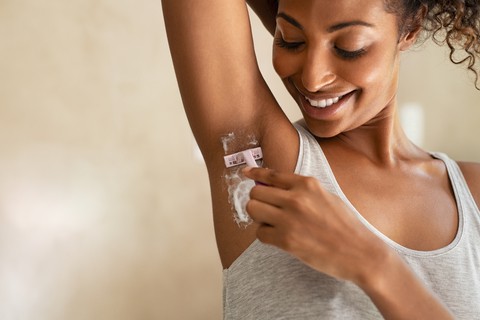If you struggle with underarm sweat, you’ve probably heard this advice before: Shave your underarm hair. But why does it seem like you sweat more after shaving? Does shaving increase sweat production?
You don’t actually sweat more after shaving your armpits, but you notice the beads of sweat more. Hair often catches the sweat beads before they stain your clothes, so you don’t notice them unless you sweat a lot. However, when you remove the hair, the sweat reaches your clothes easier.
In the rest of this article, I’ll explain how underarm sweat occurs and address whether removing the hair from that area affects the amount you sweat.

Does Shaving Your Armpits Reduce Sweat and Smell?
If you live in a humid climate or just naturally sweat a lot, you’ve probably heard people tell you to shave your underarm hair to reduce sweat. But does that actually work?
Shaving your armpits doesn’t necessarily reduce sweat and smell. However, it can help keep your armpits cleaner by removing hair and accumulated sweat and bacteria. However, you can also reduce sweat simply by washing your armpit regularly.
Before we look at the impact of underarm hair on sweat, let’s try to understand how sweat works.
What Causes Sweat and Smell?
The human body has sweat glands scattered throughout. There are two main types of sweat glands — Eccrine and Apocrine.
Eccrine sweat glands are located just under the skin, all over the body. These glands are responsible for sweating in the palms, back, feet, or neck.
Apocrine sweat glands open directly into hair follicles and are located in places with a lot of hair growth. These include:
- Underarms
- Top of the head (scalp)
- Groin
Apocrine glands only activate at adolescence, which is why body odor increases at that age.
Sweat doesn’t actually have a smell itself. However, when it comes into contact with bacteria on the skin, the combination of the two often releases a bad smell. Other factors that affect body odor include the following.
- Hormonal changes: Many believe that a person’s sweat smell changes when pregnant or on hormone treatment. Some research also suggests that women smell differently during ovulation.
- Food: Foods rich in sulfur can increase smelly sweat on your body. Certain spices, vegetables like broccoli or cauliflower, or even red meat are examples of sulfur-rich foods.
- Body conditions or diseases: Certain issues like diabetes, gout, or infections can also cause bad body odor.
There are three main types of sweating that indicate how often you sweat.
Normal Sweating
As the name suggests, this type of sweating indicates a normal level for your age and weather conditions.
People who sweat normally produce sweat only when the weather is warm and humid or because of internal body conditions like stress or hormones.
Hyperhidrosis
People with hyperhidrosis sweat excessively. They may sweat even in cold weather or regardless of external factors.
Common causes of hyperhidrosis include:
- Faulty nerve signals (Primary Hyperhidrosis)
- Diabetes
- Thyroid problems
- Cancer
- Medication side effects
- Infections
- Menopause
Hypohidrosis
Hypohidrosis is when people sweat far less than they should. Although sweat can be inconvenient, it’s actually a useful way for the body to cool down. A lack of sweating can lead to the body overheating.
Common causes of hypohidrosis include:
- Nerve disorders
- Skin injuries
- Medication side effects
- Dehydration
- Skin conditions like psoriasis or scleroderma
How Does Hair Affect Sweat?
Hair on its own doesn’t change the amount you sweat, but it may make it look like you sweat more or less.
In most cases, thick hair growth in the armpits might hold onto sweat drops for longer, leading to the impression of excessive sweating. This also prevents the sweat from evaporating.
Hair is also a breeding ground for the bacteria that cover the surface of our bodies. If you have a lot of underarm hair, you might have more bacteria in that area, leading to bad body odor. This issue is why many doctors advise people to shave if they suffer from excessive sweating or body odor.
However, in the same way hair growth can make it seem like you sweat a lot, it can also create the illusion of less sweat. Many people think they sweat more after shaving because they see more sweat patches on their clothes.
The truth is that hair can sometimes form a soft barrier between the skin and the clothes, so it takes longer for the sweat to actually reach your clothes. So, shaving doesn’t actually increase sweat, but it removes the barrier between the skin and clothes, making sweat patches appear faster.
Conclusion
While shaving doesn’t make you sweat more, it can create an illusion of more sweat because it removes the layer of hair between your skin and clothes. In reality, shaving can actually reduce body odor and allow sweat to evaporate faster.
